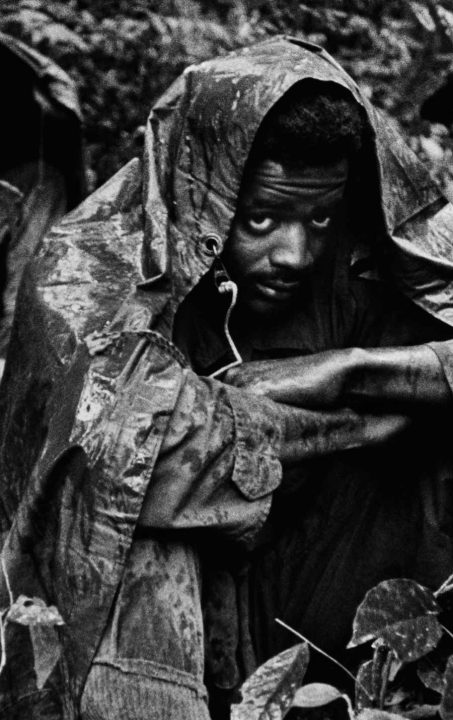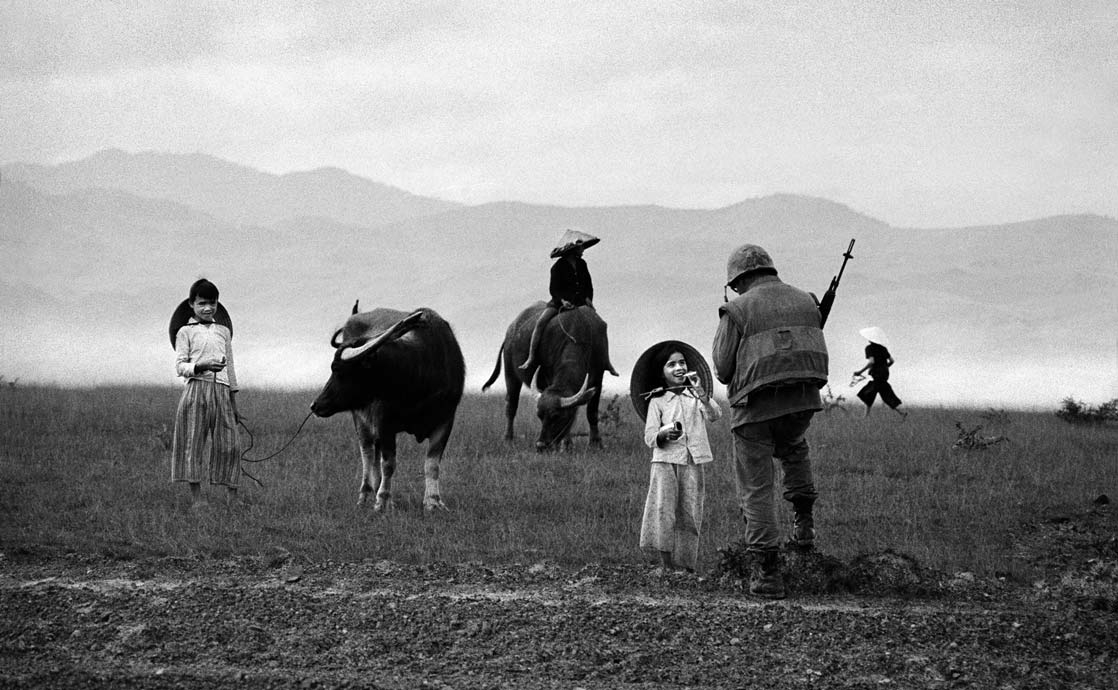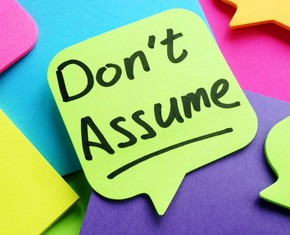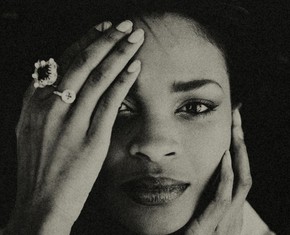The views expressed in our content reflect individual perspectives and do not represent the authoritative views of the Baha'i Faith.
When I came back from Vietnam, like many ex-soldiers, the war had completely traumatized me. As a young man of 20, I experienced hideous things there that no human being should ever have to witness.
Back home, I thought I’d survived, but the war continued – in me.
During the day, every time I heard a sudden loud noise I hit the dirt. At night I woke up thrashing and yelling, bathed in sweat, convinced by a recurring nightmare that I was back in battle.
I tried for normalcy. I returned to college, but the students I encountered there, who were all about the same age as me, seemed hopelessly young, naïve and frivolous, children without any clue. My personality seemed to change – previously happy, I now had a hard time mustering a smile. I couldn’t stand to see anyone watch television, convinced that they had no idea what the real world was like, that they were wasting their lives while my friends lost theirs.
I related to very few people, trusted no one, angered easily, had a hard time forming and sustaining relationships, kept my feelings and thoughts to myself, and walked around in the world trying to function but actually existing in a constant state of hyper-vigilance, convinced beyond any reason that fate would soon find me and kill me.

At the time, in the early 1970s, the term “post-traumatic stress disorder” hadn’t been invented yet, but looking back on it now, I figure I got all the symptoms and then some.
Thankfully and fortunately, I had somewhere to turn, a spiritual refuge in the hour of my deepest need. The Baha’i teachings kept me whole. Luckily, they also kept me from seeking refuge, like so many of my fellow veterans did, in the mindless anesthesia and ultimate addiction of alcohol or drugs. Instead, for quite some time I suffered alone, swimming in a fetid pool of isolation, grief, fury, doubt, and pain. I sought no professional help or counseling, completely convinced that no one could understand what I had seen and was going through.
Gradually, however, I discovered that a daily spiritual discipline of meditation, prayer and reading from the deep ocean of the Baha’i writings helped me enormously. In that prayerful state, I learned I could center myself in a transcendent mystical reality, find an inner place of calm, peace, and safety, and soothe my wounded psyche. After a few years of devoting myself to that practice, the more pronounced PTSD symptoms began to fade. My deep, loving relationships with my wife and my children helped tremendously, too.
Still, more than fifty years have elapsed since that war, and I continue to feel its effects every day. The nightmares rarely visit any more, thankfully, and now I’ve developed ways to trust more people than before, but that hyper-vigilant awareness has never left. I can’t sit with my back to the door in a public place. I fight a tendency toward cynicism – but hey, who doesn’t, these days? Trivial conversations tend to send me right out of the room. I have a harder self-protective emotional shell than I’d like to have, and my anger sometimes gets the best of me if I’m not careful. Personally, I feel like I still have a long way to go.
But here’s the point of all this – it took me many years to recognize that PTSD doesn’t just come from the traumatic experiences themselves. It comes from something much more profound – the fact that war shatters any and all assumptions about the world as a just and moral place.
When we’re children, if we grow up in a normal or even semi-normal family environment, if we have some kind of spiritual training, if our household is not in perpetual chaos, if we receive a reasonably safe, secure, loving upbringing, we usually come to internalize and believe in some basic version of justice and fairness – which allows us to base our lives on the assumption that a kind of moral order exists in the universe.
Our parents, if they’re not totally absent or dysfunctional or alcoholic or mentally ill, typically teach us the simple, normal childhood equation that good behavior results in rewards, and bad behavior results in punishment. In a word, they teach us trust. Accordingly, we grow up trusting that reality has some semblance of justice at its core, and as adults tend to regard life as having a kind of inherent balance, where reward and punishment accompany a sense of right and wrong. Believing in this innate moral order in the universe means that we adhere to the usual, predictable outcomes that go with that code.
War completely destroys those assumptions, because its human hell has no morality.
In war, the usual human equations of right and wrong break down and completely collapse. Goodness will get you dead. Instead, war rewards bad behavior – even the worst types of cruel, evil, homicidal behavior. War is fundamentally anti-human. Unlike the myths and the movies, war contains no redeeming qualities. War turns all morality into a sham and a shambles, upending and laying waste to everything good and decent and kind that you ever loved or learned or saw.
The Baha’i teachings call war “darkness upon darkness”, as in this passage from Abdu’l-Baha written immediately after the horror of World War I ended:
This recent war has proved to the world and the people that war is destruction while universal peace is construction; war is death while peace is life; war is rapacity and bloodthirstiness while peace is beneficence and humaneness; war is an appurtenance of the world of nature while peace is of the foundation of the religion of God; war is darkness upon darkness while peace is heavenly light; war is the destroyer of the edifice of mankind while peace is the everlasting life of the world of humanity; war is like a devouring wolf while peace is like the angels of heaven; war is the struggle for existence while peace is mutual aid and co-operation among the peoples of the world and the cause of the good-pleasure of the True One in the heavenly realm.
Typically we think of war as visible death and destruction – the taking of peoples’ physical lives and the destroying of cities, towns and villages. But the death and destruction of war also happens at a much deeper level, destroying trust in one another, demolishing the moral and spiritual underpinnings of humanity and killing the humanity in the humans themselves. War not only destroys the body, it can also destroy the soul. Worse, it not only destroys the souls of individuals, but also destroys the souls of entire peoples and countries. Like acid, it corrodes the soul of the society that wages war.
That’s why nations that wage war have such dire problems afterwards. Statistics have shown that in most countries when the soldiers come home crime rates inevitably rise, marriages fail at higher rates, families are shattered, addictions proliferate, the costs of social services go up, and entire societies lose their stability. “Like a devouring wolf,” Abdu’l-Baha called the impact of war, understanding both its immediate and its long-term effects.
Half a century later, I realize, I’m still furious.
I’m furious at the wholesale waste of war, at the devastating loss of so many friends, at the deaths of so many complete strangers, at the murder of so many children, at the needless waste of resources that could have gone to positive purposes, at the injuries, physical and psychological, that so many still bear, at the cruelty and moral wreckage, at the anger and pain so many have suffered, at the destruction of the Earth and its fragile environment, at the arrogance and stupidity and insanity of my fellow human beings who still expect war to solve anything, at the massive loss of life and love and trust. What a waste.
With this fury boiling inside me, to this day I find it hard to overcome the great grievance and victimization I sometimes feel for being forced to go to war. But hey, we all have grievances, right? We certainly do, and justifiably so. No human life escapes pain and suffering, so we’re bound to have a sense of being victimized by our suffering.
Carrying around those deep grievances, however, makes for a heavy load, doesn’t it? That psychic weight of pain and grief can prevent us from living joyfully and happily – and it can contribute to the perpetuation of more pain, grief, and violence, too.
Because many of us live in cultures where a sense of grievance and victimhood tend to predominate, I wanted to write this series of essays to explore that phenomena, try to jettison it out of my own system, and see if we can find some solace, and some answers, in the Baha’i teachings.
You May Also Like
Comments

















Foad